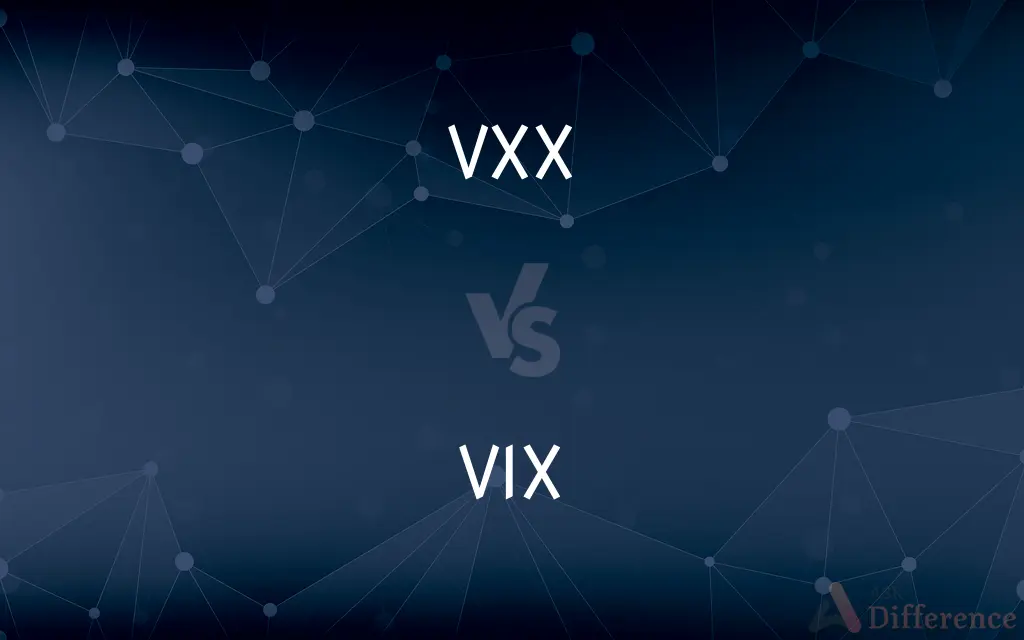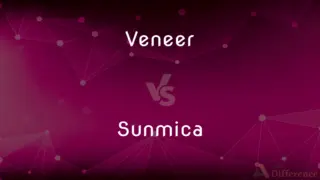VXX vs. VIX — What's the Difference?
Edited by Tayyaba Rehman — By Fiza Rafique — Published on December 2, 2023
VXX is an ETF tracking VIX futures, while VIX is a volatility index measuring expected market volatility.

Difference Between VXX and VIX
Table of Contents
ADVERTISEMENT
Key Differences
VXX is a well-known Exchange Traded Fund (ETF) that aims to provide exposure to the volatility of the stock market. On the other hand, VIX is the ticker symbol for the Chicago Board Options Exchange's (CBOE) Volatility Index.
VXX is designed to mimic the performance of certain VIX futures contracts. While VIX itself isn't directly investable, it provides an estimate of the stock market's expected volatility over the next 30 days, based on options prices.
VXX, by holding a mixture of VIX futures, seeks to capture a portion of the movement of the VIX. Conversely, the VIX serves as a measure or gauge, representing market participants' views on future volatility.
To summarize, VXX is a financial instrument that investors can buy and sell to gain exposure to volatility, while the VIX is a mathematical construct that provides a snapshot of anticipated market volatility.
Comparison Chart
Type
Exchange Traded Fund (ETF)
Volatility Index
ADVERTISEMENT
Tradable?
Yes
No (but derivatives based on it are)
Represents
Performance of certain VIX futures
Expected 30-day market volatility
Based on
VIX Futures
S&P 500 index option prices
Primary Use
Investment and hedging
Volatility measure and derivatives base
Compare with Definitions
VXX
VXX aims to mimic the performance of the VIX through futures.
The performance of VXX is closely linked to the movement of the VIX.
VIX
VIX is known as the "fear index".
During financial crises, the VIX often spikes.
VXX
VXX is affected by contango and backwardation.
Due to contango, the VXX might underperform the VIX over time.
VIX
VIX represents a 30-day forward projection of volatility.
The VIX offers insights into the market's short-term volatility expectations.
VXX
VXX provides exposure to short-term volatility.
John bought VXX, anticipating an increase in short-term volatility.
VIX
VIX is based on S&P 500 index option prices.
The VIX rises when traders buy more protective options on the S&P 500.
VXX
VXX can be used as a hedge against market downturns.
To protect her portfolio, Sarah invested in VXX.
VIX
VIX measures expected market volatility.
A high VIX value indicates market participants expect more volatility.
VXX
VXX is an ETF tracking VIX futures.
Investors can buy VXX to get exposure to market volatility.
VIX
VIX is not directly investable but has derivatives.
Traders can't buy VIX directly but can trade VIX futures and options.
Common Curiosities
What is VXX?
VXX is an Exchange Traded Fund (ETF) that tracks VIX futures.
Can I invest directly in the VIX?
No, the VIX itself isn't directly investable, but there are derivatives based on it.
How does VXX relate to the VIX?
VXX aims to mimic the performance of the VIX by holding certain VIX futures.
What is the VIX?
VIX is the CBOE's Volatility Index, representing expected market volatility over the next 30 days.
Are there other products like VXX?
Yes, there are other volatility-related ETFs and ETNs, each with its characteristics.
How frequently is the VIX updated?
The VIX is updated regularly during market hours, reflecting changing market conditions.
Why is the VIX called the "fear index"?
It's often viewed as a gauge of market risk, uncertainty, or stress.
How do VXX and VIX differ in their usage?
VXX is used for investment and hedging purposes, while VIX is a measure of expected volatility.
What is contango in the context of VXX?
Contango is when longer-term VIX futures are more expensive than short-term ones, potentially impacting VXX's performance.
Is a high VIX always bad?
Not necessarily. A high VIX indicates expected volatility, but not necessarily a market decline.
How is the VIX calculated?
VIX is calculated using the implied volatilities of a wide range of S&P 500 index options.
Can VXX be a long-term investment?
Due to factors like contango, VXX is generally considered a short-term investment or hedge.
Why might an investor consider VXX?
An investor might consider VXX to hedge against potential market downturns or to speculate on volatility.
Does VXX pay dividends?
No, VXX does not typically pay dividends as its focus is on tracking VIX futures.
Can I use the VIX for long-term market predictions?
VIX is a measure of short-term expected volatility and is not designed for long-term market predictions.
Share Your Discovery

Previous Comparison
Veneer vs. Sunmica
Next Comparison
Synchronous Motor vs. Asynchronous MotorAuthor Spotlight
Written by
Fiza RafiqueFiza Rafique is a skilled content writer at AskDifference.com, where she meticulously refines and enhances written pieces. Drawing from her vast editorial expertise, Fiza ensures clarity, accuracy, and precision in every article. Passionate about language, she continually seeks to elevate the quality of content for readers worldwide.
Edited by
Tayyaba RehmanTayyaba Rehman is a distinguished writer, currently serving as a primary contributor to askdifference.com. As a researcher in semantics and etymology, Tayyaba's passion for the complexity of languages and their distinctions has found a perfect home on the platform. Tayyaba delves into the intricacies of language, distinguishing between commonly confused words and phrases, thereby providing clarity for readers worldwide.














































